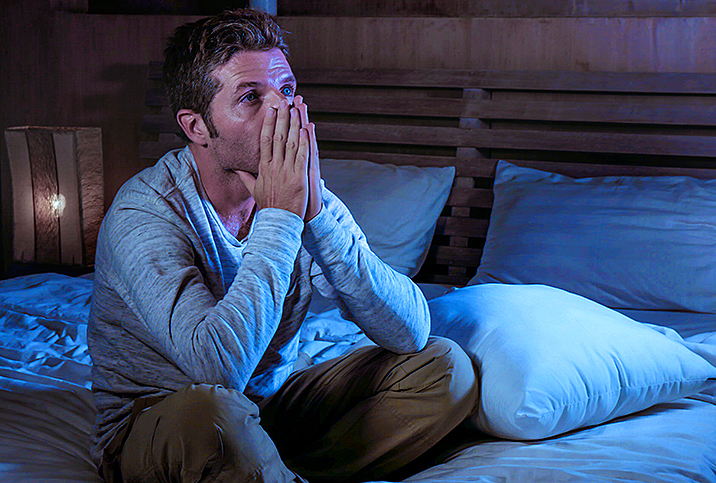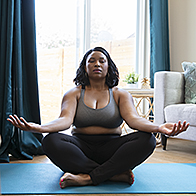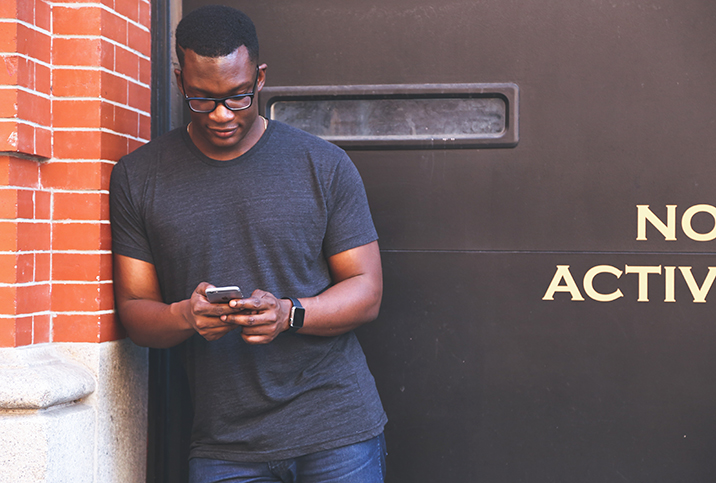How to Gain Control Over Your Anxiety

Anxiety is a feeling most of us know all too well—so much that it's become ingrained into pop culture, from TV shows to songs to memes. But what is it really? And how can we prevent the paralyzing moments of anxious thoughts and feelings that keep us from getting through our day?
What is anxiety?
Most people know how anxiety feels: the racing thoughts, sweaty palms, biting your nails and more. Other physical symptoms include an upset stomach, a tension headache, difficulty sleeping, agitation and restlessness.
The first sign of anxiety may be a physical sensation, but it's usually the mental projection into the future that causes us to worry.
'Anxiety doesn't have to run your life. We can do practices that reduce stress, make us feel calmer and develop our ability to be present.'
"I see anxiety as a long-term pattern of thought that creates a lot of fear, worry, tension and stress," said Rev. Connie Habash, a licensed psychotherapist and author of "Awakening from Anxiety." "We worry and obsess about what could happen."
"Anxiety doesn't have to run your life," Habash continued. "Instead, we can do practices that reduce stress, make us feel calmer and develop our ability to be present. The goal is not to expect it to go away and never come back."
As human beings, we can't expect to completely overcome anxiety, but there are practiced strategies that can allow you more control and instill a more positive perspective.
1. Recognize your thought patterns
We might not always be consciously aware of the thoughts that are making us anxious, instead wondering, "Why do I always feel so tired or irritable?" Recognizing your thought patterns is a good way to get ahead of such complications.
One easy practice is to write down all of your first thoughts in the morning. Habash explained that journaling is not just an activity to get your thoughts out, but also to provide an insight into your habitual thought patterns. For example, you might notice that you're projecting current worries into your view of the future.
"Of course, we're projecting awful things," Habash explained. "If we were projecting good things, we wouldn't feel so anxious."
2. Set a schedule
"Once we've identified our negative thought patterns, we can start to take back control. Setting a schedule and making a to-do list is a good practice for anxious clients," said Shagoon Maurya, a counseling psychologist, psychotherapist and founder of Safe Space.
The theory goes: When you've written down something, especially in a way that's put it within a time limit, you'll feel more in control.
"Anxiety feeds anxiety more, and it's hard to get out of the loop," Maurya said. "Sticking to a schedule prevents those anxious thoughts from creeping in because you know, more or less, what will happen."
3. Practice grounding techniques
Maurya explained a grounding "5-4-3-2-1" technique can help bring you back to the present moment if you're feeling anxious. To ground yourself, think of five things you can see, four things you can feel, three things you can hear, two things you can smell and one thing you can taste.
"We're not distracting ourselves as much as letting ourselves know that we're safe. All these exercises bring you back to the present moment," Maurya said.
4. Spend time in nature
We all have to earn a living, and this sometimes means adopting a robotic, rigid routine. When we step outside and spend at least five minutes in nature, we can get out of that mindset and back into the present.
If you're stuck inside all day because of the weather or are confined to an office, you can use something from nature to ground yourself. For example, Habash uses a river rock that is weighty and substantial to feel grounded.
"When I put it in my hand, I connect to the qualities of that rock," Habash shared. "When we're connected to the earth and grounded, we're less likely to be blown away by what's happening in the world or by our own thoughts."
5. Shift your perspective
Spending too much time focusing on things outside of our control can make us feel anxious. For example, you might be worried you'll get COVID, and lose your home, job or relationship as a result of the virus.
"Uncertainty is always present in our lives," Habash explained. "There's no sure thing that's going to happen. Often, the unexpected things that happen are either neutral or even positive. Put your energy into projecting positive things into the future. Envision things working out well in your relationship or being strong no matter what happens."
6. Practice breathing techniques
"The key is to use breathing techniques that activate the parasympathetic nervous system (PNS)," said Vanessa Loder, a women's leadership expert and mindfulness coach. "When you breathe, if your exhale is longer than your inhale, it activates your PNS, which will cause you to feel relaxed, peaceful and calm."
Loder recommends a simple breathing technique: inhaling for a count of three and then exhaling for a count of six. She suggests doing at least three rounds of this to calm yourself.
Another technique she suggests is box breathing. Inhale to the count of four, hold for four, exhale for four, and hold for four. Again, do this three times for the best effect.
As you go forward, try to adopt a lifestyle that keeps you in the here and now.
"The more that we can be in the present moment, the less likely we'll experience anxiety," Habash explained. "Anxiety isn't about what's right here and right now. There's not much to be anxious about here at this moment."




















